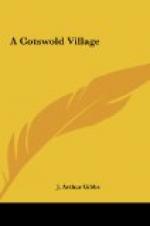“My dog has gotten
zitch a trick
To visit moids
when thauy be zick;
When thauy be
zick and like to die,
Oh, thether gwoes
my dog and I.
“My dog is good
to catch a hen,—
A duck and goose
is vood vor men;
And where good
company I spy,
Oh, thether gwoes
my dog and I.
“Droo aal the
world, owld Gaarge would bwoast,
Commend me to
merry owld England mwoast;
While vools gwoes
scramblin’ vur and nigh,
We bides at whoam,
my dog and I.
“Ov their furrin
tongues let travellers brag,
Wi’ their
vifteen neames vor a puddin’ bag;
Two tongues I
knows ne’er towld a lie,
And their wearers
be my dog and I.
“My mwother told
I when I wur young,
If I did vollow
the strong beer pwoot,
That drenk would
pruv my auverdrow,
And meauk me wear
a thzreadbare cwoat.
“When I hev dree
zixpences under my thumb,
Oh, then I be
welcome wherever I qeum;
But when I hev
none, oh, then I pass by,—
’Tis poverty
pearts good company.
“When I gwoes
dead, as it may hap,
My greauve shall
be under the good yeal tap
In vouled earms
there wool us lie,
Cheek by jowl,
my dog and I.”
GLOSSARY.
stwuns = stones. quaar = quarry. yare = hair. avoor = before. auwn = own. furrin = foreign. greauve = grave. thauy = they. yead = head. mead = made. dree = three. pleace = place. pwoot = pewter. yeal = ale. qeum = come. graw’d = grew. braags = brag. zshou’d = should. beass = bass. auverdrow = overthrow. vouled earms = folded arms. zitch = such.
The song itself is as old as the hills, but I have taken the liberty of appending a glossary, in order that my readers may be spared the trouble of making out the meaning of some of the words. It was a long time before it dawned upon me that “vouled earms” meant “folded arms “; “auverdrow” likewise was very perplexing. Like many of the old ballads, it sounds like a rigmarole from beginning to end; but there is really a great deal more in it than meets the eye. George Ridler is no less a personage than King Charles I., and the oven represents the cavalier party. (See Appendix.)
Such songs as these are deeply interesting from the fact that they are handed down by oral tradition from father to son, and written copies are never seen in the villages. The same applies to the play the mummers act at Christmas-time; all has to be learnt from the preceding generation of country folk. But the great feature of our smoking concerts and village entertainments has always been the reading of Tom Peregrine. This noted sportsman, who writes one of the best hands I ever saw, has kindly copied out a recitation he




